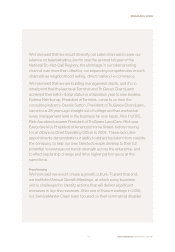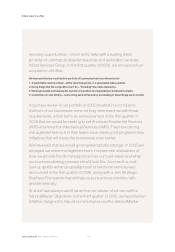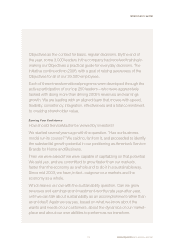American Home Shield 2005 Annual Report Download - page 17
Download and view the complete annual report
Please find page 17 of the 2005 American Home Shield annual report below. You can navigate through the pages in the report by either clicking on the pages listed below, or by using the keyword search tool below to find specific information within the annual report.
P. 1 5 SERVICEMASTER 2005 ANNUAL REPORT
Results of Operations
Consolidated Review of 2005 and Outlook for 2006
2005 was an encouraging year for ServiceMaster (the
“Company”) as it reported revenue and earnings per share
in line with management’s expectations. It was also a year
where every one of the Company’s business segments
achieved growth in revenue and two of the Company’s core
businesses, Terminix and TruGreen ChemLawn, each
surpassed $1 billion in revenue for the first time. In 2005,
the Company overcame significant challenges including
record high fuel prices, steadily rising interest rates, unusual
weather aberrations, including the hurricanes, and continued
expansion in telemarketing restrictions. The Company
overcame these obstacles by focusing on what it could
control, like safety, customer satisfaction, and sales force
and geographic expansion.
In 2006, the Company will be implementing three signifi-
cant changes to its business portfolio. (1) The Company
intends to sell American Residential Services (ARS) and
American Mechanical Services (AMS). These are businesses,
in large markets, with strong management teams. These
companies are making good progress on key initiatives that
will make them even better in the future. But there were two
fundamental issues that led the Company to the difficult
decision to sell these operations. First, is the Company’s
need to have fewer priorities, so that it can pursue them
with greater intensity. Second, the Company concluded
that ARS and AMS businesses are not compatible with the
Company’s overall business model. ARS and AMS are not
built around the kind of repeat business experienced in the
Company’s other operations, and hence the ARS and AMS
operations are more cyclical and weather dependent.
These two businesses also operate at much lower margins,
and they would require meaningful time and capital to
establish widely recognized national brands such as those
the Company enjoys in each of its other businesses.
(2) In February 2006, the Company announced an agreement
to acquire InStar Services Group, Inc. InStar is a leading
direct provider of commercial disaster response and recon-
struction services in the United States with 2005 revenues
of approximately $130 million. InStar provides a continuum
of services, from planning prior to an event, to emergency
response following the event and ultimately including
cleaning, recovery and reconstruction. InStar has been
growing rapidly and is expected to grow at a much faster
rate than the businesses held pending sale. InStar has solid
profit margins and operates in an extremely large market
with a tremendous opportunity to gain a larger share. The
Company believes there is a great strategic fit in combining
the capabilities of InStar with the Company’s existing disas-
ter restoration business within ServiceMaster Clean.
ServiceMaster Clean’s disaster restoration business
already totals over $500 million in customer level revenue
through its franchisee network and has been growing at
double digit rates for more than five years. The Company
expects the InStar acquisition, after interest and amortization
costs, to be accretive in the $.01 per share range for the
period in 2006 following the acquisition.
(3) The Company has launched Project Accelerate, an
internal, multi-phase reengineering project designed to
improve the effectiveness and efficiency of all functional
support areas. Upon completion, Project Accelerate will
result in an organization that is better aligned to respond
faster to the marketplace, its customers, and provide better
day-to-day support for front line associates who are in the
homes and businesses of customers every day. This project
is consistent with the Company’s goal of becoming system-
atically stronger and is expected to have a positive financial
impact on the enterprise. The reduction in direct support
costs, combined with more effective purchasing of outside
services and other cost reductions, is targeted to produce
annualized gross savings in the range of $50 to $75 million,
and net savings of $25 million to $35 million after reinvest-
ments into the business and the impact of factor cost
increases. Those savings should begin to be realized in
2006, and reach end state (on an annualized run rate basis)
in 2007. Excluding the effects of one-time severance and
implementation costs, the amounts of which the Company
will be determining over the course of the first quarter 2006,
the Company estimates the 2006 savings from Project
Accelerate in the $0.02 per share range, helping the
Company to offset rising factor costs and contribute to
continued strong bottom-line growth.
Going forward, the Company will be comprised of leading
service brands that collectively have strong cash flow, solid
revenue growth potential, greater operating margins and
stronger returns on invested capital. The Company
believes that its improved portfolio, combined with solid
execution of its business strategies, will enable it to deliver
mid to high-single digit revenue growth and low double-
digit earnings growth in 2006. From a base of earnings from
continuing operations of $0.61, the Company’s earnings per
share target for 2006 is $0.69. Based on the actions the
Company is taking in 2006, the Company’s target is to
achieve high single digit revenue growth and earnings per
share growth in the mid-teen level during 2007 and
beyond, with cash from operations growing and continuing
to substantially exceed net income.
Management Discussion and Analysis of Financial Condition and Results of Operations
























